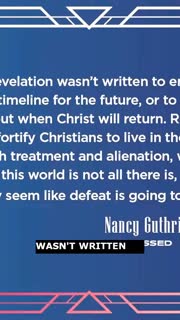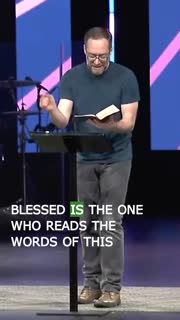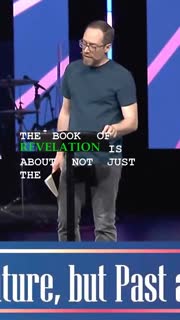Understanding Revelation: Hope, Symbolism, and Christ's Sovereignty
Devotional
Sermon Summary
Bible Study Guide
Sermon Clips
### Quotes for Outreach
1. "The book of Revelation is not about a bunch of different things. It feels like it. Sometimes you read it and it's like, oh, this and that, and what's going on. But at the heart of it, it really is about one thing. It is a singular revelation about one thing. And this is where we get to rule two. Rule two is it's not about the news. It's about Jesus." [08:36] (20 seconds)
2. "The word revelation in Greek is actually the word apocalypse. We use the word apocalypse these days to mean the end of the world. It's apocalyptic. But in Greek, the word apocalypse doesn't mean the end of the world. What it means is to show something, to reveal something, to unveil something, to pull back the curtain and make known something that was hidden." [09:44] (19 seconds)
3. "When you peel back the curtain, you say, who's running the world? What's the ultimate reality? The world looks like it's run by politicians and global corporations and billionaires and the media and markets and all of these sorts of things. But reality is, the king on the throne is one who sacrifices and serves, one who has cured death, one who will never lie to us, who will always be faithful and true, one who loves us." [13:20] (24 seconds)
4. "Revelation wasn't written to entertain, to set out a timeline for the future or satisfy our curiosity about when Christ will return. Revelation was written to fortify Christians to live in the world, enduring its harsh treatment and alienation with a firm belief in God. A firm confidence that this world is not all there is. And that in fact, what may seem like defeat is going to give way to victory." [33:54] (22 seconds)
5. "Blessed is the one who reads the words of this prophecy and blessed are those who hear it and take to heart what is written in it because the time is near. Blessed, blessed. Revelation was not written to satisfy your curiosity or to scare you or to be a survival manual in case you're in the last days. It was written to bless you." [36:54] (21 seconds)
### Quotes for Members
1. "The book of Revelation is about not just the future, but the past and the present as well. Not just the future, but the past and the present as well. This may be the most surprising of the rules, because most people, they never ask the question, what's the book of Revelation about? What era is it talking about? Because everybody assumes they know. It's about the future, right? It's about the last days. It's about the end of the age. This is something that has yet to happen, right? This is things to come. That's what Revelation's about. So it must be about the future." [15:43] (27 seconds)
2. "The book of Revelation is not literal, but it is definitely true. It's not literal, but it's definitely true. This book, it probably doesn't need to be said. If you read it once, you start to pick this up. It is full of symbolism. It is full of imagery. You're going to have a woman riding on a dragon and a beast coming out of a sea and horsemen riding around and lampstands and trumpets and a tree of life and the lion and the lamb and all of these different images. And I'll tell you this. The vast, vast majority of them are not meant to be taken literally." [20:10] (30 seconds)
3. "When you read about hunger and violence and persecution and hardship coming on people in the book of Revelation, most of us, when we're in the relative comfort of 21st century suburban America, we look at that and we say, I hope I'm not around when that happens. That sounds like the end of the world. But the original audience, they read it and they said, that sounds like Tuesday. I am here when this is happening. It's happening to me right now." [33:24] (23 seconds)
4. "The reason it blesses us, the main way is by getting us excited about what's to come. Because this is not about how bad it'll be in the end. It's how good it's gonna be forever. This is not about the end of the world. It's about the beginning of a new one. Here's what it promises. It says, we are going to see our king with our own eyes. He's gonna be here and he is amazing. He will return and he will vanquish all his enemies and he will raise us from our graves and he will sit on his throne and he will banish sorrow and tears and death and suffering and evil and sin. And he is going to remake the world and all shall be well. And his kingdom will have no end." [37:56] (40 seconds)
5. "When you realize that, when you see that Jesus is the ultimate reality, all the other realities fade away. They back up. They become less important. This is the important thing about an apocalypse. It shows us what's really going on. In the words of Nancy Guthrie, she's an author that we're recommending. One of her books, as we go through this series, if you want to dig deeper, she wrote this book called Bless. This is what she says about an apocalypse. She says this, apocalypse can reveal to us that some of the things we thought were important, beautiful, or secure are actually fleeting, ugly, and destined for destruction." [14:36] (33 seconds)
Ask a question about this sermon
1. "The book of Revelation is not about a bunch of different things. It feels like it. Sometimes you read it and it's like, oh, this and that, and what's going on. But at the heart of it, it really is about one thing. It is a singular revelation about one thing. And this is where we get to rule two. Rule two is it's not about the news. It's about Jesus." [08:36] (20 seconds)
2. "The word revelation in Greek is actually the word apocalypse. We use the word apocalypse these days to mean the end of the world. It's apocalyptic. But in Greek, the word apocalypse doesn't mean the end of the world. What it means is to show something, to reveal something, to unveil something, to pull back the curtain and make known something that was hidden." [09:44] (19 seconds)
3. "When you peel back the curtain, you say, who's running the world? What's the ultimate reality? The world looks like it's run by politicians and global corporations and billionaires and the media and markets and all of these sorts of things. But reality is, the king on the throne is one who sacrifices and serves, one who has cured death, one who will never lie to us, who will always be faithful and true, one who loves us." [13:20] (24 seconds)
4. "Revelation wasn't written to entertain, to set out a timeline for the future or satisfy our curiosity about when Christ will return. Revelation was written to fortify Christians to live in the world, enduring its harsh treatment and alienation with a firm belief in God. A firm confidence that this world is not all there is. And that in fact, what may seem like defeat is going to give way to victory." [33:54] (22 seconds)
5. "Blessed is the one who reads the words of this prophecy and blessed are those who hear it and take to heart what is written in it because the time is near. Blessed, blessed. Revelation was not written to satisfy your curiosity or to scare you or to be a survival manual in case you're in the last days. It was written to bless you." [36:54] (21 seconds)
### Quotes for Members
1. "The book of Revelation is about not just the future, but the past and the present as well. Not just the future, but the past and the present as well. This may be the most surprising of the rules, because most people, they never ask the question, what's the book of Revelation about? What era is it talking about? Because everybody assumes they know. It's about the future, right? It's about the last days. It's about the end of the age. This is something that has yet to happen, right? This is things to come. That's what Revelation's about. So it must be about the future." [15:43] (27 seconds)
2. "The book of Revelation is not literal, but it is definitely true. It's not literal, but it's definitely true. This book, it probably doesn't need to be said. If you read it once, you start to pick this up. It is full of symbolism. It is full of imagery. You're going to have a woman riding on a dragon and a beast coming out of a sea and horsemen riding around and lampstands and trumpets and a tree of life and the lion and the lamb and all of these different images. And I'll tell you this. The vast, vast majority of them are not meant to be taken literally." [20:10] (30 seconds)
3. "When you read about hunger and violence and persecution and hardship coming on people in the book of Revelation, most of us, when we're in the relative comfort of 21st century suburban America, we look at that and we say, I hope I'm not around when that happens. That sounds like the end of the world. But the original audience, they read it and they said, that sounds like Tuesday. I am here when this is happening. It's happening to me right now." [33:24] (23 seconds)
4. "The reason it blesses us, the main way is by getting us excited about what's to come. Because this is not about how bad it'll be in the end. It's how good it's gonna be forever. This is not about the end of the world. It's about the beginning of a new one. Here's what it promises. It says, we are going to see our king with our own eyes. He's gonna be here and he is amazing. He will return and he will vanquish all his enemies and he will raise us from our graves and he will sit on his throne and he will banish sorrow and tears and death and suffering and evil and sin. And he is going to remake the world and all shall be well. And his kingdom will have no end." [37:56] (40 seconds)
5. "When you realize that, when you see that Jesus is the ultimate reality, all the other realities fade away. They back up. They become less important. This is the important thing about an apocalypse. It shows us what's really going on. In the words of Nancy Guthrie, she's an author that we're recommending. One of her books, as we go through this series, if you want to dig deeper, she wrote this book called Bless. This is what she says about an apocalypse. She says this, apocalypse can reveal to us that some of the things we thought were important, beautiful, or secure are actually fleeting, ugly, and destined for destruction." [14:36] (33 seconds)










